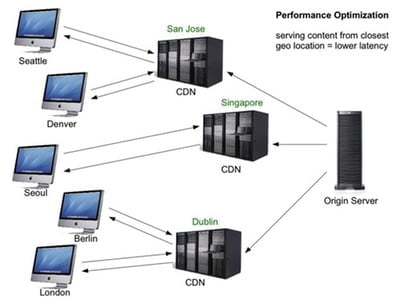Why You Should use a CDN

Updated May 10, 2018
Find out what is a CDN, or Content Delivery Network, how they are used and why you might need a CDN to improve your website performance. CDN’s are everywhere around us, being used for everything from streaming movies to reading the daily news.

What is a CDN?
We all interact with Content Delivery Networks (CDN’s) in some way or another – without realizing it. That’s the beauty of the whole approach. But what is a CDN exactly?
What does CDN stand for? CDN stands for Content Delivery Network. It’s easiest to understand what a CDN is, but let’s look at each term in the phrase:
1 – Content
A CDN is all about the content. Perhaps you publish videos to a global audience, distribute news stories, have a loyal audience of blog readers or participate on social networks.
Regardless of the specifics, the web is all about words, images, videos… CONTENT.
2 – Delivery
CDN’s are all about Delivering content to users, 24x7x365, across all continents, on all devices, when the users want it delivered.
Delivery is accomplished through multiple point of presence (PoP) servers in their network.
3 – Network
A CDN, at the core, is a series of caching servers, spread about geographically, so there’s always one close by a user, anywhere in the world.
The network of PoP’s takes one copy of the content from the host server and spreads multiple static copies across the CDN’s caching system. What does CDN stand for, well now you know!
How Does a CDN Work?
A website that does not use a CDN is running on a single server (or a server cluster) but all these are in the same location (the datacenter of the hosting provider). So all website visits are served by the same server.
A website that uses a CDN is still running on a single server (or a server cluster) but the content to the user is served through a number of servers depending on the user location. As you can see from the image below, users located in Berlin will be served by the CDN server in Dublin (which is the closest location) and not the origin server.

What the benefits from using a CDN?
Utilizing a CDN has a number of benefits for webmasters, the most important are highlighted below.
Faster websites
When visitors arrive at a website with CDN, technology redirects them to the server closest to their geographic location. This means that visitors in the UK or Asia would be redirected to servers in this proximity instead of jumping the pond to a main server in the US. The end result is faster loading times.
Reliability
An important benefit of a CDN is that it can prevent website downtime (see also: what is 99.9 uptime?) especially in situations where a website gets a large number of visits at the same time. For example imagine that one of your articles goes viral in social media and you get a lot of traffic in a short period of time. It is very common that the extra traffic will cause a webserver crash.
With a CDN the load on the server is less because visitors are distributed to a number of servers (based on their location) and also because the content served is cached which means that the processing and resources required by the main web server are less.
In addition to the above, the duplication of the content across the broad server network makes it possible for the CDN to serve as an active archive, while at the same time providing storage and data backup available for website recovery, if necessary.
Better User Experience
Page views and bounce rate is often directly tied to a website’s performance. When using CDN, the faster loading times has a direct correlation with improved visitor experience. Visitors who arrive at a fast loading website are more likely to stay and explore instead of bouncing right off again after a brief stay.
Faster load times are also a prerequisite for any website wanting to gain traffic from mobile users who need quick responses when browsing the website from their mobile phones.
SEO Benefits
Google smiles at websites that load faster. What’s more, Google rewards these speedy sites with higher search rankings.
Multiple Connections
For a webpage to load completely the web browser has to make a number of ‘calls’ to the web server. Web browsers have limits on how many simultaneous connections can exist on a single domain. Most browsers will allow up to four active connections. This means a fifth connection will be blocked until a previously queued file has been completed.
If a webpage for example has a lot of images, this may limitation may cause unnecessary delays. A website’s CDN files (css, images, javascripts) are hosted on a different domain and this allows the browser to establish more connections at the same time.
Included Analytics
Many CDNs furnish usage reports, thanks to their pricing structure that tends to involve charging by the byte. By analyzing usage reports, website owners can supplement preexisting website analytics with additional data.
Benefits of a CDN for Specific Websites
Many different types of websites, from ecommerce to personal sites, can benefit from a CDN:
Ecommerce Websites
With CDN, an ecommerce website can reduce the rate of cart abandonment, increase conversion rate and enjoy repeat business when customers return to the website to make additional purchases.
Blogs, Information websites and Media
Websites that publish information can benefit from CDN, also. With faster loading times, images and video are delivered more quickly at higher resolutions. Advertising performance on these websites generally improves, too.
Conclusion
A CDN is useful when you have users in different countries and when your pages include a lot of static resources. If you are already using a VPS for your website or online business then you may use tools like gtmetrix to evaluate your website’s performance and decide if you need to use a CDN or not. Either way, you already know what CDN stands for.
Looking for web hosting? Look no further! KnownHost offers Shared, Cloud, VPS and Dedicated hosting to suit any budget – all with proven best uptime on the planet! Check out our plans and pricing here!
Jenifer
September 11, 2014 at 6:23 amNice article.. Thanks for posting..